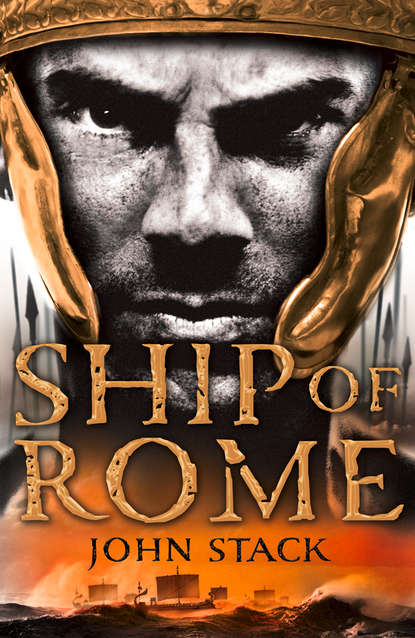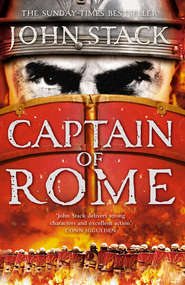По всем вопросам обращайтесь на: info@litportal.ru
(©) 2003-2024.
✖
Ship of Rome
Автор
Год написания книги
2019
Настройки чтения
Размер шрифта
Высота строк
Поля
‘You men, to my aid!’ Karalis shouted to three sailors who were lying on the deck around him, realizing that, if he did not check the Sidon’s momentum once she cleared the current, the galley would spin her stern into the whirlpool and the ship would be lost.
The sailors were dumbstruck, petrified, unable to comprehend the forces attacking their ship.
‘Now!’ Karalis bellowed. ‘Before I cast you overboard to the monster beneath us!’
They were instantly on their feet, their fear of the captain and his threats overcoming their terror and confusion. The men followed the captain to the aft-deck, the violently spinning ship causing one to lose his balance and fall over the side rail.
The force of the turning ship was pressing the rudder hard against the bulkhead, as if it were nailed to the very timbers of the ship. The three men took hold of the six-foot-long tiller and, with all their strength, attempted to heave the rudder back to true. The resistance was incredible, the twenty-knot current gripping the bow of the Sidon, causing water to rush past the stern, engulfing the blade of the rudder, transferring its energy up the shaft to fight the strength of the three men. The resistance lessened as the bow cleared the whirlpool and, although Karalis and his men fought hard to bring the rudder to true, he knew the fight was hopeless, the momentum of the eightyton galley too great. With his fears echoed in the cries of his men, Karalis felt the whirlpool grip the stern of his ship, sucking the vessel deeper into the maelstrom, dooming all on board.
At only sixty yards’ distance, Atticus could hear the screams of the slaves and the snapping of their oars as Charybdis took hold of his enemy. Within seconds the galley had swung her bow into the vortex, which spun the enemy ship until her stern was facing the Aquila. Atticus watched in dread fascination as a group of men fought the tiller of the enemy vessel, their forlorn efforts overcome by the power of the whirlpool, the Carthaginian galley inexorably drawn into Charybdis as the current took a firm grip of her stern, dragging the ship ever closer to the centre of the vortex. The cries of terror were beyond any that Atticus had ever heard.
‘Septimus!’ Atticus called.
The centurion approached. He was shaking his head in amazement. ‘By the gods, Atticus, I have never seen such a sight. What might does this sea have, that it can take a ship and devour her?’
‘Charybdis has taken one for us,’ Atticus began, ‘the Carthaginian on the lead ship’s starboard flank is heading directly for the whirlpool. They’ll realize the danger so they’ll either break off their pursuit or try to navigate around. Either way they’re no longer a threat. We’re still too far from the mouth of the strait to escape the last ship. She’ll run us down, knowing that the rest of the fleet are not far behind. Our only chance is to attack and disable her and then disengage before reinforcements arrive. Once we clear the mouth of the strait we’ll raise sail, using the trade winds sweeping south along the Tyrrhenian Sea. The Aquila can outsail any Carthaginian trireme.’
Septimus nodded, agreeing with the captain’s logic. He looked back over the stern rail again at the two remaining Carthaginian galleys, picking out the one they would need to attack. Atticus had levelled the odds. Now it was the turn of Septimus and his men to take the fight to the enemy.
On the foredeck of the Elissar, Gisco watched the scene before him with mounting disbelief. He couldn’t accurately judge the distance between the Sidon and the Roman galley from his position on the portside aft-quarter of the chase, but he knew it had to be close. The oars of the Roman galley had been suddenly raised from the water and before Gisco could question the action they had re-engaged and were once again moving as if nothing had occurred. Then, without warning, the Sidon seemed to buckle and swing wildly to starboard. Even now she continued to spin at incredible speed, her hull breaking up under the intolerable stress. Gisco was staggered by what he saw.
‘What sorcery is this?’ the captain beside Gisco muttered aloud. ‘It is the work of Pluto. We must abandon the chase.’
‘No!’ Gisco bellowed, the captain’s words allowing him to give vent to his frustration and fear at what he had just witnessed. ‘There will be no withdrawal. Give me attack speed now and signal to the Hermes to continue the pursuit.’
‘Yes, Admiral,’ the captain blurted, caught between his fear of the man before him and the unknown forces attacking the Sidon.
Gisco now fully understood the actions of the Roman trireme, from her erratic and seemingly suicidal course to her inexplicably raising oars, and the thought of how they had played him for a fool fuelled the anger within him. Armed with the knowledge that the Roman ship had passed through these waters at attack speed, he gambled that the way ahead was clear, driven now by a desire for revenge.
Captain Maghreb had watched the fate of the Sidon with equal horror from the aft-deck of the Hermes. The doomed galley was one hundred yards ahead, the sound of snapping timbers as the hull disintegrated mixed with the last cries of her crew as they were consumed.
‘All stop!’ Maghreb roared, his own fear consuming him. The oars of the Hermes were raised, the galley instantly losing momentum. Maghreb looked across to the Elissar, expecting to see her oars similarly raised. He could only stare in disbelief as the order to continue the pursuit was signalled from the admiral.
‘Steerage speed, lookouts to the foredeck!’ Maghreb roared as he immediately tore his eyes from the Elissar to scan the waters ahead, expecting any moment to see the vortex that would engulf his ship. The galley slowed to two knots, steerage speed, feeling her way through the water as she edged forward, searching for the rim of the maelstrom. Maghreb could only hope that the Hermes could navigate around the whirlpool in time to join the Elissar in full pursuit.
‘Come about,’ Atticus ordered, his gaze steady on the approaching Carthaginian galley, her partner now trying to manoeuvre around Charybdis.
‘Be ready, Gaius,’ Atticus added, ‘she’ll try to manoeuvre to ram. That’s where her strength lies and our weakness.’
Gaius nodded, his entire being focused on the enemy galley. The Carthaginian vessel turned three points to starboard in an effort to run diagonally across the Aquila’s bow. Gaius knew that the enemy would try to turn tightly to come at them from the beam, to ram them amidships. He turned the Aquila three points to port to counter the enemy’s move, keeping the bows of both galleys on an intercept course.
Septimus had assembled his marines on the main deck, preparing the boarding parties that would sweep over the rails of the Aquila onto the Carthaginian galley. They had separated into two groups. The first group of twenty hastati and twenty principes, new recruits coupled with seasoned soldiers, were moving to station themselves on the foredeck. The second group, the older triarii, were ranged across the main deck, ready to counter any boarding party from the enemy ship. All had discarded their four-foot-long scutum shields for a hoplon. The lighter rounded shield was a Greek design, perfectly adapted to the speed and agility needed for boarding, and the marines had trained hard to overcome their past allegiance to the legions’ standard shield.
‘Steady men,’ Septimus said, sensing the aggression coupled with nervous tension in the soldiers assembled at his back. The enemy galley was only one hundred yards away and closing fast.
The Elissar tore through the waves at eleven knots, every turn of her bow matched and countered by the approaching Roman galley. Gisco had not anticipated the Romans would turn into the fight so soon, expecting his prey to continue their headlong rush for the mouth of the strait in a vain hope of making their escape. The reversal brought instant, instinctive commands as the galley was prepared for immediate battle. The helmsman worked hard to manoeuvre the Elissar into a ramming position, but his skills were evenly matched by those of the Roman helmsman. The Roman galley was now fifty yards away, her bow pointed directly at the Elissar’s. There would be no opportunity to ram. As the bows connected they would be made fast by both crews, each looking to board the other.
Gisco turned from the approaching galley to look out over the stern rail. The Hermes was skirting the northern rim of the whirlpool, her tentative steps enraging the admiral. He had ordered the galley to join him in the pursuit, their combined strength initially needed to ensure the Romans would not escape. Now the Elissar would face the Romans alone and Gisco could not suppress the blood lust rising within him, the chance to gain some revenge for the loss of one of his galleys. Further behind, the Carthaginian fleet was advancing at battle speed. Once the two galleys engaged, Gisco estimated the fleet would be upon them within fifteen minutes.
Gisco left the aft-deck and strode determinately to the foredeck, leaving the helm in the charge of the captain. The admiral would command the boarding party himself, standing firmly in the front line. Gisco tightened his grip on the hilt of his sword, feeling the unyielding iron in his hand. He drew his weapon in one sudden release, the blade singing against the scabbard.
‘Prepare for impact. Make ready to board!’
His men roared with naked aggression. Gisco let them roar, let them fill their hearts and nerve with anger, a rage that he would throw against the Romans.
‘Prepare to release!’ Septimus ordered, and his twenty hastati hoisted their pila, their heavy javelins, up to shoulder height.
Gaius made one final adjustment to the rudder as the two galleys converged at attack speed. He gripped the worn timber of the tiller firmly in his hands as he held the course true, bracing his legs to cope with the anticipated command. The galleys were now only ten yards apart.
‘Loose!’ Septimus roared.
At almost point-blank range, all twenty hastati shot their pila into the massed ranks of Carthaginians on the foredeck of the Elissar. Each spear was eight feet long, with an iron shank that gave the weapon a fearsome penetrating power. As each spear struck its target, its shank broke off from the handle, rendering the weapon useless. The unexpected volley of javelins wrought tremendous carnage amongst the Carthaginians, breaking up the enemy formation that was poised to board the Aquila.
‘Starboard side, withdraw!’ Atticus roared, before taking off in a run towards the foredeck.
The order carried clearly to the slave deck and the drum master repeated the order to the starboard-side rowers. The slaves immediately stopped their stroke and pulled the oars in hand over hand. Within an instant the oars were withdrawn, with only their two-foot-long blades exposed outside the hull.
Gaius leaned the rudder slightly over to converge the two ships and the cutwater of the Aquila’s prow tore into the extended starboard-side oars of the Elissar. The rowers of the Elissar were thrown from their positions like rag dolls as the fifteen-foot oars they manned were struck with the force of the seventy-ton Roman trireme travelling at eleven knots. Many of the oars splintered, while some held together to strike the slave at the handle end of the oar. In the confined space of the slave deck, with the men chained to their positions, there was nowhere to run to, and by the time the Aquila had run the length of the Elissar, the starboard-side slave deck of the Carthaginian galley was strewn with broken bodies.
‘Grappling hooks!’ Septimus ordered as the Aquila’s foredeck came in line with the enemy’s aft. Immediately three of his men threw the four-pronged hooks across the narrow gap between the galleys. As the hooks found purchase on the Elissar’s deck, the marines clambered to grab hold of the attached ropes and pull with all their might. The gap was closed to less than six feet. Septimus ran forward and jumped on the starboard rail, balancing easily with his gladius in one hand and rounded hoplon shield in the other.
‘Men of the Aquila, to me,’ he shouted, and jumped the gaping void beneath the two galleys, landing solidly on the aft-deck of the Carthaginian ship.
The marines roared as the blood lust of battle overwhelmed them and they followed the centurion without hesitation over the rails of the enemy ship, clamouring to be the first to draw Carthaginian blood. Septimus barged straight at the man nearest him and struck him squarely with his shield, using his momentum to knock the man off his feet, sending him reeling into someone behind. The few Carthaginians remaining on the aft-deck fled before the charge. Behind the marines, Atticus and Lucius jumped onto the deck of the Carthaginian galley, axes in their hands. Their task would take only minutes, time Septimus and his men would have to buy with their blood.
The war cries of the marines spilling over the rail of the Elissar fuelled the frustration within Gisco at the sudden reversal. The air around him was filled with the screams of injured and dying men while beneath his feet the deck still reeled from the impact of the Roman trireme’s run against the starboard-side oars of his galley. The ranks of his men had disintegrated under the hammer blows of the pila volley, and they were in chaos, with neither focus nor formation.
‘Men of the Elissar to me!’ Gisco bellowed as he charged from the foredeck. The veteran soldiers reacted more swiftly than the untested, and so the line of attack was ragged and uncoordinated, but their ferocity bore them on in a headlong rush along the length of the Elissar. They struck the line of Romans at full tilt, their momentum checked within a stride by the near-solid wall of shields.
Gisco sidestepped a thrust from a Roman marine before countering the stroke with a slash to the Roman’s thigh. The man yelled in pain as the sword bit deeply into the flesh, but before the admiral could deliver the killing blow his sword was stayed by another Roman, who followed the parry with a vicious attack. Gisco immediately realized that although each of the Romans fought as one man, they also fought as a team, overlapping their attacks, their coordination sapping the strength of the Carthaginians’ original charge. Gisco renewed the surge of the counterattack, urging his men on through the ferocity of his own charge. The Elissar would not fall easily.
The Carthaginian war cries reached a new high as another lunge was made in an effort to break the Roman line of battle. The sound spurred on Atticus and Lucius and sweat streamed from their bodies as they redoubled their efforts to sever the tiller from the rudder. The weathered toughened timber was as hard as iron, but with each axe blow small chips flew away and already they were halfway through the four-inch-diameter section.
On the main deck, Septimus saw a breach developing and immediately fed his best fighters into the gap. Within the space of two vicious minutes the gap was sealed once more and the tide of Carthaginians checked. The last of the reserves were now engaged. The next breach could not be held. If the Carthaginians broke through, the fight would become chaotic and all chance of a withdrawal would be lost.
The tiller finally parted under the blows of Atticus and Lucius. Now, even if the Carthaginian galley managed to get back under way, the loss of her rudder would render her useless.
‘Septimus!’ Atticus roared. ‘Withdraw!’
Septimus heard the signal. ‘Fighting withdrawal!’ he roared, his men instantly stepping back towards the aft-deck.
The sudden break-off in resistance threw the Carthaginian attack and a gap opened between the lines.
The twenty triarii who had remained on the Aquila now loosed volleys of spears into the flank of the Carthaginian forces, checking their advance, allowing the marines vital seconds to mount the aft-deck rails and recross onto the Aquila. Within moments the bulk of the marines were aboard, with just a small knot remaining, Septimus amongst them. Under an almost constant volley of spears, the Carthaginians reared up in attack again, their centre driven by a demonic commander, rage emanating from his frame as he tried to cut off the remaining marines. The lines of the grappling hooks were severed as Septimus jumped across the opening gap, the last man to do so.
Gisco could only look on in futile rage as the Roman galley re-engaged her oars, hastening her escape. The Carthaginian fleet was still two thousand yards away, too far behind to stop the Romans reaching the mouth of the strait. All around him his men stood at the side rail of the aft-deck, shouting defiance and insults of cowardice at the Romans. Gisco remained silent, his eyes searching the rails of the enemy ship. The two men he sought were on the foredeck, standing side by side, the taller man, the marine centurion, recognizable from the fight. They were the commanders and he instantly saw they were watching him intently. Gisco burned the images of their faces into his mind. As the gap opened to one hundred yards the Roman galley began to come about to resume her course northwards.
‘Aquila,’ Gisco read on the stern of the galley.









